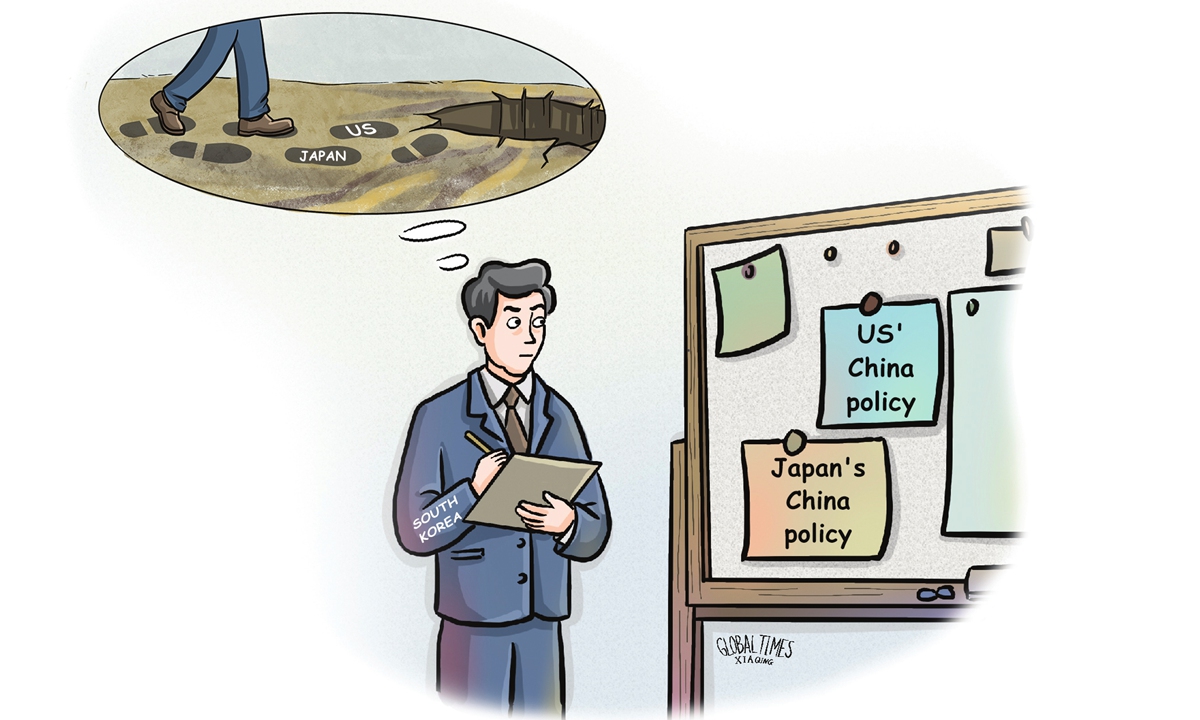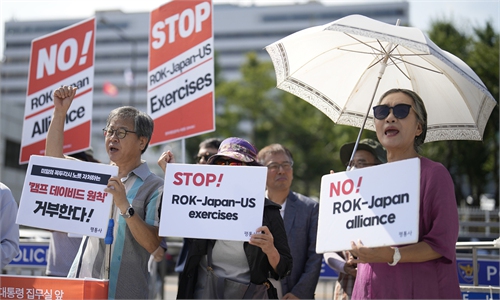
Illustration: Xia Qing/GT
Recently, shortly after the US-Japan-South Korea trilateral summit at Camp David, several South Korean officials have emphasized that their country pays great attention to its relations with China. For instance, on August 21, South Korean Foreign Minister Park Jin stated that Seoul "explained in detail" the results of the meeting through diplomatic channels following the Camp David gathering and intends to maintain a stable relationship with China.At first glance, it sounds like South Korea values the development of its relationship with China. However, regardless of the diplomatic rhetoric used by South Korea, it cannot hide the fact that it is positioning itself against China.
South Korean government officials are eager to express their high regard for the relationship with China, primarily out of concern that China may take diplomatic and economic retaliatory measures against South Korea. After all, the THAAD incident serves as a cautionary tale, and Seoul is naturally fearful of the consequences of its wrong anti-China actions.
Therefore, South Korea is sending conciliatory signals, hoping that China will swallow this bitter pill. South Korea is well aware of its weaknesses, and if China were to truly take countermeasures, South Korea would likely suffer greatly.
The secondary objective is for South Korea to prove to domestic audiences that its leaning toward the US' and Japan's foreign policies has brought opportunities rather than risks to itself. In short, South Korea aims to prove that the foreign policy shift of the Yoon Suk-yeol government is correct by promoting the "stabilization" of the China-South Korea relationship.
However, South Korea clearly underestimates the seriousness of the issue. The US, Japan and South Korea have formed a "quasi-alliance" relationship and have baselessly criticized China's maritime claims and recent actions in the South China Sea. They also interfered in the Taiwan question. In fact, the US, Japan and South Korea have already regarded China as a "common threat" and have decided to take a series of measures against it, including joint military exercises. After returning to South Korea, South Korean President Yoon Suk-yeol was criticized by critics for launching an "anti-communist" campaign.
All signs indicate that, regardless of how South Korean officials package it, it is an undeniable fact that their country is joining the US-Japan anti-China circle. As the quasi-alliance relationship between the US, Japan and South Korea, to a large extent, restricts Seoul's freedom of choice, it is highly probable that South Korea will be involved in conflicts outside the Korean Peninsula, becoming a sacrifice in geopolitical competition.
South Korea should reflect on the mistake of THAAD in order to strive for friendly relations with neighboring countries. As an East Asian country deeply influenced by Confucianism, South Korea should have a clear understanding of the essence of Confucian culture, which is "harmony." They should also be well aware of China's diplomatic policy that emphasizes the idea of "harmony is precious."
However, South Korea's policy has already been heavily influenced by Japan and the West, and the Yoon administration's policy toward China has lost its bottom line, rendering all well-intentioned advice from China in vain.
The more China earnestly advises South Korea, the more South Korea overestimates its own value and misjudges China's goodwill. This is because the ruling elites in South Korea believe that China dare not take countermeasures against it, reasoning that China's economy is not doing well, that South Korea holds the semiconductor technology that China needs, and that the US and Japan will help South Korea join forces against China.
China has followed the Five Principles of Peaceful Coexistence in its neighborhood diplomacy, considering South Korea as a partner in the hope of achieving common prosperity and security. Just as President Xi Jinping mentioned during his visit to South Korea in 2014, "a good neighbor is more valuable than gold." When South Korea is a good neighbor, we reciprocate its goodwill. Today, if South Korea becomes a "bad neighbor," we must be prepared to respond. Our policy toward South Korea should be to listen to its words and observe its actions, but also to abandon any illusions and be prepared for potential challenges.
The author is the director and professor of the Center for Korean Peninsula Studies at the Shanghai University of International Business and Economics. opinion@globaltimes.com.cn

